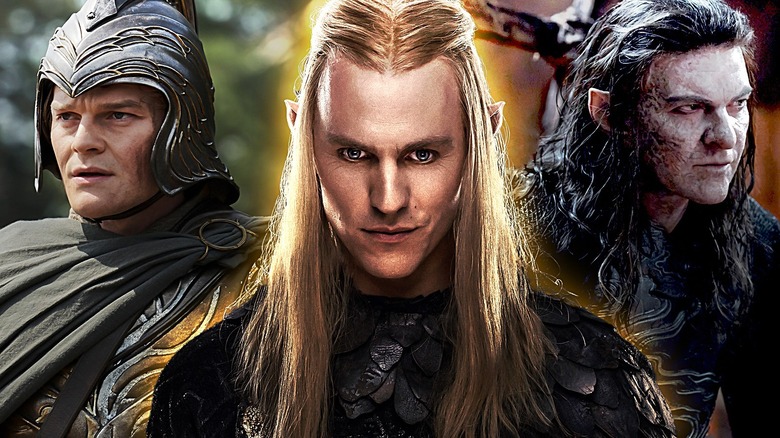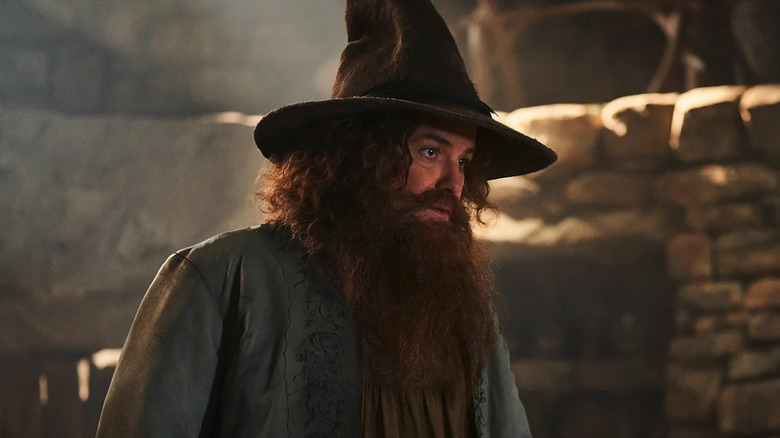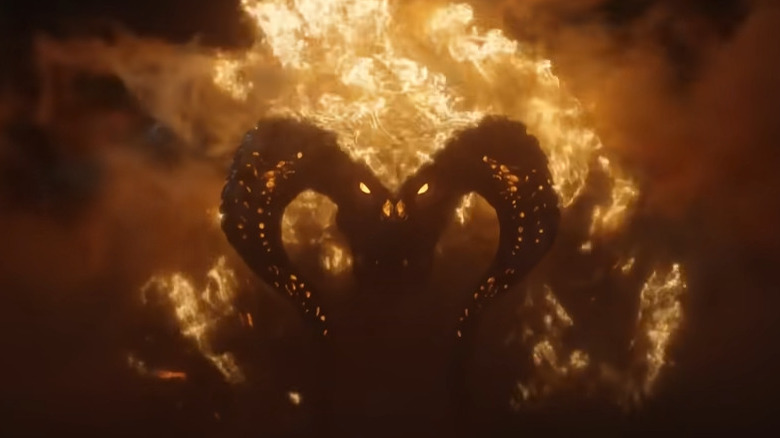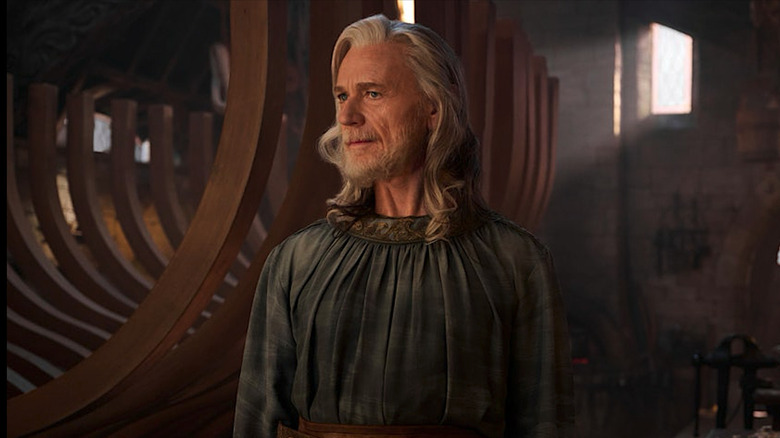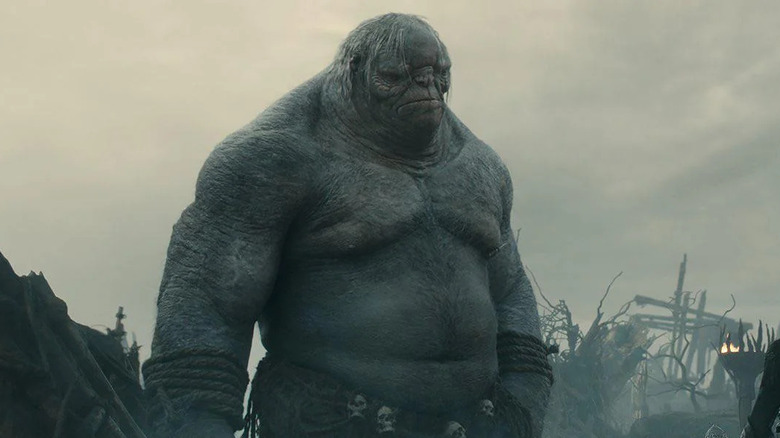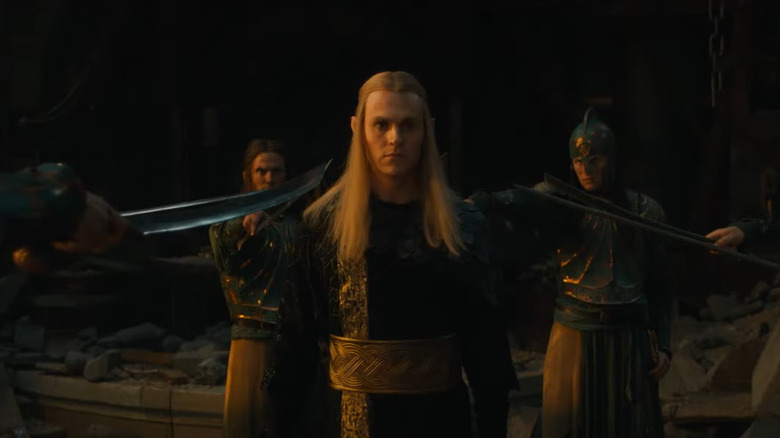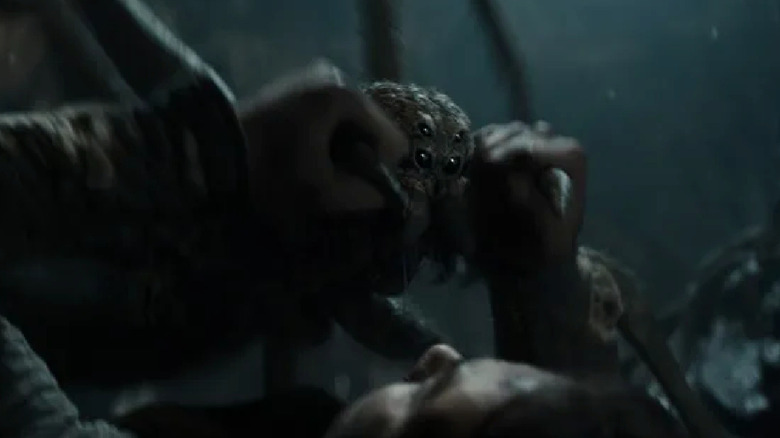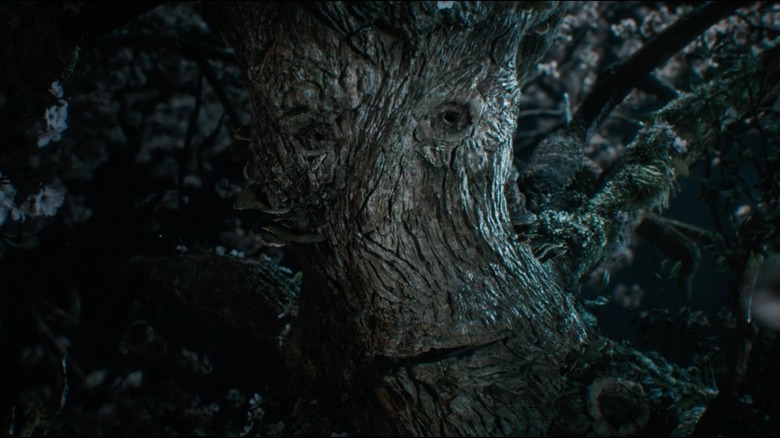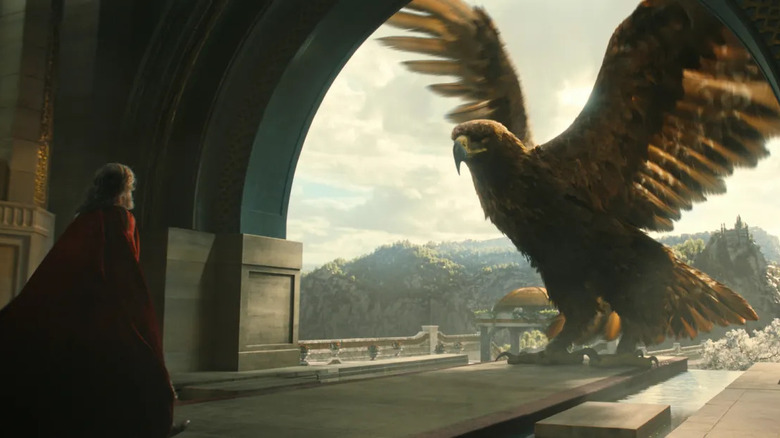Some Major Lord Of The Rings: The Rings Of Power Details Have Been Revealed By An Unlikely Source
This article contains (likely) spoilers for "The Rings of Power" season 2.
Soundtracks are a big part of what brings a story to life — nowhere more than in Middle-earth. Howard Shore's award-winning score for Peter Jackson's trilogy is an iconic part of the "Lord of the Rings" experience. Bear McCreary's musical compositions for Amazon Studios' "The Rings of Power" series, while newer, are already a fantasy staple, as well. They're also a body of work that is about to get a lot bigger when season 2 arrives on August 29, 2024.
In preparation for the new music, the streaming studio released the 25 names of the songs that will be on the digital track list, which will be released for fans' listening pleasure on August 23, six days before the season premieres. With so many titles, it's no surprise that there are also some light spoilers in the mix. This isn't anything new. Older "Star Wars" fans will remember when the original motion picture soundtrack for "Star Wars: Episode 1 – The Phantom Menace" (which ended up being George Lucas's lowest-ranked "Star Wars" film) gave a blow-by-blow reveal of the plot, including blatant, story-ruining spoilers about "Qui-Gon's Noble End" and "Qui-Gon's Funeral."
The upcoming season of "The Rings of Power" has similarly titled spoilers aplenty. While none of them go quite so far as to give away character deaths, they do connect to many important plot lines and even hint at some unexpected faces. For those of you who don't want to spoil the viewing experience, this is where you should click away. Everyone else, let's dig into the titles and see what hints and insights they reveal for JD Payne and Patrick McKay's quickly unfolding Second Age story.
The River-daughter
Let's start with the biggest surprise of all. Track 14 on the album is titled "The River-daughter (feat. Raya Yarbrough)." Yarbrough is an eclectic singer/songwriter and the spouse of Bear McCreary, which is fun. Of more interest as far as spoilers are concerned, though, is the title itself. The name River-daughter in Tolkien's writings refers to Goldberry, the Daughter of the River and the wife of Tom Bombadil.
Amazon Studios already revealed that Bombadil would be in the show (played by Rory Kinnear), but until now, nothing has been said or shown regarding his otherworldly wife. Goldberry is a spiritual being who represents aspects of nature. The trouble-making sprite initially drags Bombadil into a river when they first meet, but the couple overcomes this rough start to the relationship and end up getting hitched. (The woodland animals even show up to attend. It's a whole thing.)
When Frodo and his Hobbit friends meet Tom in "The Fellowship of the Ring" book, he brings them home, where Goldberry is waiting and ready to play the part of hostess. The husband and wife duo care for their guests for multiple days, providing superb food, sparkling (and insightful) conversation, and musical entertainment, to boot. Suffice it to say that Bombadil is already great on his own. Bombadil and Goldberry together, though? That'll be a riot. If the title means the Enigma's better half will be in season 2, this is going to be fun.
Durin's Bane
Tolkien is a sucker for a good bane. The One Ring is called "Isildur's bane" (which is bad news for Maxim Baldry's character). Théoden's horse is called his "bane" when it rolls onto him, pinning him down during the Battle of the Pelennor fields. If there's one bane that outshines the rest, though, it has to be the balrog in Moria. The fiery demon is literally dubbed "Durin's Bane" — a title that has endured for thousands of years by the time of "The Lord of the Rings."
Its genesis, though, is likely to happen during "The Rings of Power" season 2 — especially if track 21 of the score has anything to say about it. This is titled "Durin's Bane," indicating that the angry villain awoken in the fading moments of season 1 will likely earn his cognomen soon as he terrorizes the people of King Durin III (Peter Mullan) and Prince Durin IV (Owain Arthur).
The interesting thing here is that, technically, this is all out of whack with Tolkien's original timeline.
I addressed the question of how a Balrog could be in the show in the lead-up to season 1, pointing out that in the source material, the beast doesn't wake up until 2,000 years into the Third Age. The appendix for the book "The Return of the King" states that in the year 1980 of that age, "A Balrog appears in Moria, and slays Durin VI." While there has been speculation about whether the show is using the balrog as a red herring, based on the title track, it seems Payne and McKay really are moving the monster forward in the timeline — and making him the bane not of Durin VI but of his ancestors, the third and fourth dwarves by that name.
Cirdan's Perfection
Círdan the Shipwright is a fascinating Elven leader. He is one of the oldest beings around and the only Elf in "The Lord of the Rings" to sport a beard. Círdan is one of those impressive support role characters, too. He's never fully in the spotlight, but he plays a critical role over and over again in helping the good guys survive and thrive throughout Middle-earth history.
Amazon Studios has already revealed that the important figure will be in season 2 of the show, played by Ben Daniels, and now we also know that he is getting an entire song named after him.
"Círdan's Perfection" is the fifth entry on the album, revealing that we'll probably meet the Elven sailor early on in the story. Círdan's role in Tolkien's writings is one of a bearer of ancient wisdom and endurance. He helps shepherd people to and from the Undying Lands in the West (eventually including Frodo and Bilbo at the end of "The Lord of the Rings). Círdan can also wield weapons and is present when Isildur cuts the One Ring from Sauron's hand (as seen in the opening sequence of "The Fellowship of the Ring" movie). This guy is always around, and his prominence in the soundtrack is a good sign that he'll get the same treatment in the show.
The Last Ballad of Damrod
Toward the end of the track list, there is a song titled "The Last Ballad of Damrod." This is striking for a few reasons. First, it features Meshuggah's Jens Kidman, which begs the question: are we going to get a dose of Swedish metal in this season's musical ensemble? However that might fit into the mix, the other fascinating factoid here is that the song is about Damrod. Damrod is a gigantic hill troll who was invented for the show. He's voiced by Benjamin Walker (who also plays the High-king Gil-galad) and is a battle-seasoned hill troll that showrunner Patrick McKay calls the "eater of dragon bones."
The fact that a troll is going to get a ballad may sound odd, but it actually has an interesting Tolkienian precedent. In the book "The Fellowship of the Ring," Sam Gamgee trots out a poem he composed where the protagonist, Tom, has an encounter with a hill troll. The humorous lyrics start with the lines "Troll sat alone on his seat of stone and munched and mumbled a bare old bone; for many a year he had gnawed it near, for meat was hard to come by. Done by! Gum by! In a cave in the hills he dwelt alone, and meat was hard to come by." The question for "Rings of Power" is whether the new song will emulate the light-hearted nature of Sam's Third Age poetry or if it will channel the feeling of a more serious, Second Age dirge.
Emissary at the Forge
The ninth track on the list is called "Emissary at the Forge." The reference to "forge" is likely either talking about the forges in Eregion, where Celebrimbor is already busily creating Rings of Power or the similar apparatus of the Dwarves in nearby Khazad-dûm. The part of the title that hints at a potential spoiler, though, is "Emissary."
In the book "Unfinished Tales," Sauron arrives in Eregion to help Celebrimbor make some rings. He's in his fair Annatar form, and the book says, "In Eregion Sauron posed as an emissary of the Valar, sent by them to Middle-earth ('thus anticipating the Istari') or ordered by them to remain there to give aid to the Elves."
A couple of things here. First, the Valar are the angelic, god-like guardians of Middle-earth, empowered by the Creator to oversee the world. By this time in the story, they live in the Undying Lands in the West. Second, the Valar eventually do send five of their race in the form of Wizards or "Istari" to help in the fight against Sauron. The Dark Lord heads this off by posing as an "emissary of the Valar," something that is heavily hinted at in the song title. What is the takeaway from a song titled "Emissary at the Forge"? Rough times are ahead for Celebrimbor and company, folks.
Shelob
When you have a story set thousands of years before "The Lord of the Rings," connections between the two tales can be hard to come by. There are a few Elves, like Elrond and Galadriel, who participate in both chapters of Middle-earth history. Immortal villains, like Sauron and the Balrog, are also throughlines. And then there's Shelob. While much younger than either the Dark Lord or the fiery demon of Moria, Shelob is old by the time of "The Lord of the Rings" story — and she's alive, albeit fairly young, during "The Rings of Power" story.
Shelob is also involved enough to get her own name on the soundtrack. The tenth name on the list is simply titled "Shelob," indicating that we'll spend enough time with the arachnid terror to get a song in the mix. It's also fun to note that Shelob is one of the few points where not just Middle-earth's storylines but its soundtracks overlap. Howard Shore's original score for "The Return of the King" has a song titled "Shelob's Lair." Will this new song for season 2 reflect Shelob's previous theme? Or will we get an entirely new Bear McCreary creation?
Forgiveness takes an age
The gigantic, nearly-four-minute season 2 trailer that Amazon Studios unveiled at San Diego Comic-Con in late July included the first really good visual of one of Tolkien's most tragic stories: the saga of the Ents and the Entwives. There was a blink-and-you-missed-it shot of an Entish family in season 1 (when the Stranger is shown streaking through the sky in fireball form), but it appears that Season 2 is where the Second Age arboreal story is really going to kick off in earnest — and one of the songs on the track reinforces this fact.
Track 16 is titled "Forgiveness Takes an Age." This doesn't mean much until you flip back to the SDCC trailer. When the Entwife flashes across the screen for a couple of seconds, these are the exact words that she says. What the forgiveness is about remains uncertain, though.
We know that, by the "Lord of the Rings" story, the Entwives have gone missing. We also know that the Ents are upset that their better halves chose to live in their beautiful gardens instead of with them in the forests. Perhaps in the show's version, there was a falling out and the Entwives are struggling to forgive the Ents for something in their past. Then again, maybe the line is simply a reference to one of the countless evils that the tree-folk face over the many millennia that they inhabit Middle-earth. It's also worth noting that, in "The Lord of the Rings," Treebeard sings a song that encapsulates the tragic past of the Ents and Entwives. Like Damrod's song or the Shelob connection, perhaps we'll see this Tolkien-written song reflected in the new season's music.
The Great Eagle
The thirteenth track listed is titled "The Great Eagle." On the surface, this one makes sense. Eagles are a staple of Middle-earth storytelling. They save the day in both "The Hobbit" and "The Lord of the Rings." Eagles free Gandalf from Saruman's clutches, pick up the Wizard, Bilbo, and the Dwarves before they're roasted by Goblins, and rescue Frodo and Sam from the fires of Mount Doom. They're all over the place, popping in for a few minutes, performing a eucatastrophic act, and then disappearing again.
The promotional footage for "The Rings of Power" Season 2 is also heavy on the Eagles. The first trailer revealed an Eagle arriving in Númenor. The second trailer showed more of that scene, including Ar-Pharazon (Trystan Gravelle) facing one. He also draws his sword. The track named after the great airborne beasts likely points to this same point in the story — and it doesn't bode well for the island nation.
In the source material, the Great Eagles mostly live further overseas in the West and often function as messengers of their angelic overlords. A few of them also live on Númenor itself. However, as the anti-Valar and anti-Elvish political faction called the King's Men gain power, they begin to turn on the Eagles. In "The Silmarillion," it says that in the last days of Númenor, "out of the west, there would come at times a great cloud in the evening, shaped as it were an eagle." These clouds blot out light and bring lightning. The book adds that actual eagles fill the skies in battle array as Númenor approaches its doom. However the show handles the Atlantean fate of the Númenóreans, you can bet the eagle imagery (and melodies) will continue.
